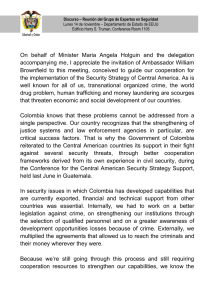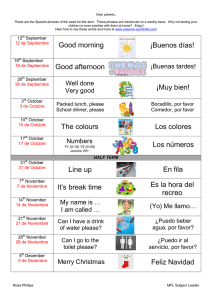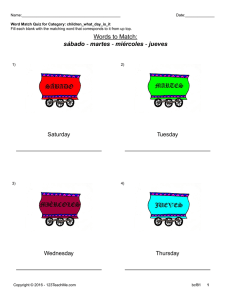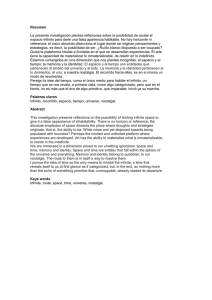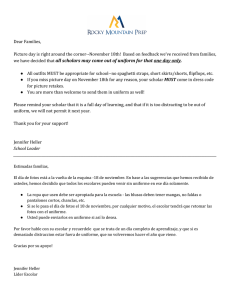Present Perfect (Presente Perfecto)
Anuncio
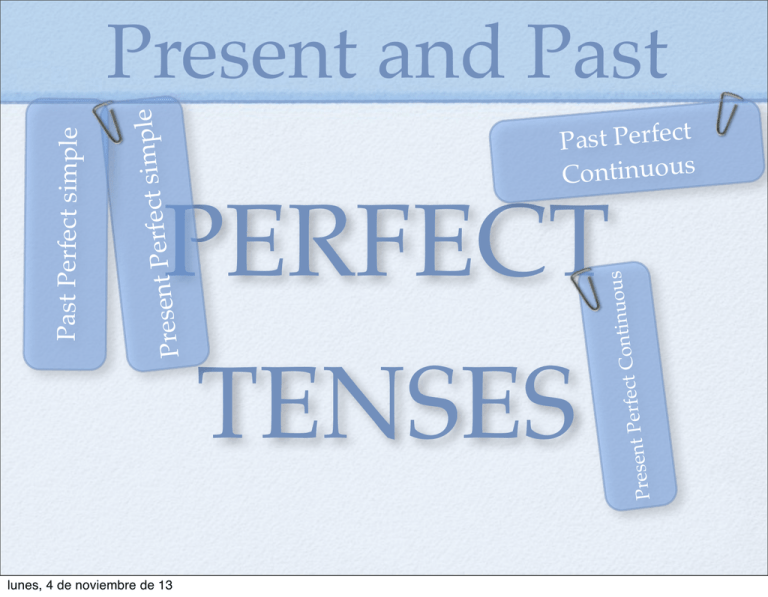
le p m i s t c e f r Present Pe Past Perfect Continuous PERFECT lunes, 4 de noviembre de 13 TENSES uous n i t n o C t erfec Present P Past Perfect simple Present and Past Present Perfect Simple lunes, 4 de noviembre de 13 Present Perfect (Presente Perfecto) Form: have + past participle (3º columna de verbos irregulares o terminación –ed en los verbos regulares) has (he/she/it/); contracciones: I’ve / you’ve / he’s / she’s / it’s / we’ve / they’ve Affirmative I have gone to London (He ido a Londres) He has gone to Brazil (Ha ido a Brasil) Interrogative Have you ever been to China? Yes, I have Has she ever seen Troy? No, she hasn’t Negative: I haven’t gone to London He hasn’t gone to Brazil Recuerda: gone to… (se usa cuando has ido algún sitio) He’s gone to Brazil (Ha ido a Brasil) (he’s in Brazil now) been to… (cuando has ido y has vuelto de ese sitio) I’ve been to Brazil (He estado en Brasil) Activity: Try this verbs in affirmative, negative or interrogative: (I) eat Chinese food (he) visit Morocco (we) study French (you) eat snake (she) work hard (they) smoke lunes, 4 de noviembre de 13 USES • Uses: El presente perfecto tiene dos usos principalmente 1. An action that has just finished (acción que acaba de terminar hace poco tiempo o en un tiempo indeterminado. Con este uso, el verbo se traduce exactamente igual que en español) e.g. I have lived in London (He vivido en Londres) Como se puede ver, no se indica cuándo he vivido allí, no se habla de fechas. Expresiones de tiempo usadas con este tiempo en este uso podrían ser: this morning/today… e.g. I have had a very big breakfast this morning (He tomado un gran desayuno esta mañana) 2. An action started in the past and continues in present (una acción que empieza en el pasado pero que continua en el presente) e.g. I’m from England but I have lived in Chipiona for eight years. (Si traducimos “Soy de Inglaterra pero he vivido en Chipiona durante 8 años” no sería lo correcto puesto que en español eso quiere decir que ya no vivimos allí. Sin embargo cuando un inglés usa este tiempo es para decir que todavía sigue viviendo allí, por lo tanto la traducción correcta sería “Soy de Inglaterra pero vivo en Chipiona desde hace 8 años”) (Aquí no se podría usar un presente simple puesto que dice desde cuándo esa acción se viene haciendo (recuerda que el presente simple sólo se usa para una acción habitual y no expresa nada más) lunes, 4 de noviembre de 13 Partículas usadas con este tiempo • For and since • For: normalmente se traduce como “durante” (período de tiempo (“for eight years”) • Since: normalmente se traduce como “desde” (punto de partida o punto exacto en el pasado “since I was a child”, “since last Christmas”) • Ever or never • Ever: se traduce como “siempre” o “alguna vez” (Have you ever been to Paris?”) • Never: se traduce como “nunca” (I’ve never eaten Japanese food”) • Already and yet • Already: se traduce como “ya”. Se usa sólo en afirmativas y se coloca en medio de las dos formas verbales. “He has already come” (ya ha venido) • Yet: se traduce como “ya” o “aún o todavía”. Se usa para negativas o interrogativas y se coloca al final de la oración. “Has he come yet?” (¿Ya ha venido?) “He hasn’t come yet” (No ha venido aún/todavía) • Just • Junto con el presente perfecto, la frase se traduciría como “acabar de…” y se coloca en medio de las dos formas verbales: “He has just come” (Él acaba de venir) • How long…? Para preguntar “¿Cuánto tiempo…? (“How long have you had this watch?” “¿Cuánto tiempo hace que tienes ese reloj?”) lunes, 4 de noviembre de 13 ACTIVITIES ON THE FIRST USE ACTIVIDADES DEL PRIMER USO • Vamos por parte: Empezaremos por el uso 1 1. Look at the picture. What has happened? (¿Qué ha pasado?) (He/clean/his shoes) He has cleaned his shoes (She/close/the door) (They/go to bed) (It /stop/rain) (The picture/fall down) lunes, 4 de noviembre de 13 ACTIVITIES 1 • Complete the sentences with the verb from the list. Use the present perfect (have/has + past participle of the verb). (recuerda que antes de empezar a hacer el ejercicio debes asegurarte de que conoces todo el vocabulario) Break buy finish do go go lose paint read take 1. have finished “Are they still having dinner?” “No, they _________________” 2. I ________________________ some new shoes. Do you want to see them? 3. 4. “Is Tom here?” “No, he __________________ to work” “_____________ you ____________ the shopping?” “No , I’m going to do it later” 5. “Where’s your key?” “I don’t know. I _______________ it” 6. 7. Look! Somebody ________________________ that window. Your house looks different. _____________ you ______________ it? 8. I can’t find my umbrella. Somebody _____________________ it. 9. 10. I’m looking for Sarah. Where _______________ she____________? “Do you want the newspaper?” “No, thanks. I ___________________ it.” • A las oraciones anteriores: 1, 2, 4, 5, 6, 7 y 10, insértales las partículas vistas anteriormente como: already, yet o just y tradúcelas. lunes, 4 de noviembre de 13 Ever and Never Ann Have you ever been to Rome? Lewis Yes, I have. Many times (¿Has ido alguna vez a Roma?) Have you ever been to Japan? No, I’ve never been to Japan Ann is asking questions to Lewis beginning have you ever…? Write the questions 1. (Paris) 2. (ride a motorbike) 3. (drive a car) 4. (play golf) 5. (eat Japanese food) 6. (sail) 7. (break your arm) 8. (visit a museum) Have you ever been to Paris? Have you ever riden a motorbike? Write answers about yourself. I’ve never been to Paris, … lunes, 4 de noviembre de 13 1. 2. 3. 4. 5. 6. 7. 8. No, I’ve never been to Paris Yes, many times No, never Yes, once No, never No, never Yes, a few times Yes, twice Other time expressions as: • Recently, so far, in the last... ➡ I haven’t seen George recently ➡Everything is going fine. We haven’t had any problems so far ➡We’ve met a lot of interesting people in the last few days • this morning, this evening, today, this week, this term, etc. (when these periods are not finished at the time of speaking) Examples: ➡ I’ve smoked ten cigarettes today ➡ Has Ann had a holiday this year? ➡ I haven’t seen Tom this morning. ➡ Ron hasn’t studied very much this term 9 lunes, 4 de noviembre de 13 • This is the first time... • It’s the first time... ➡ Ron is driving a car. He is very nervous and unsure because it’s the first time behind the wheel of a car. You can say: “This is the first time he has driven a car” (not drives) or: “He has never driven a car before” 10 lunes, 4 de noviembre de 13 SECOND USE • Uso 2 del Presente Perfecto • Estudia esto: Friday STUDY THIS Margaret and Sue are on holiday in London. Sue arrived in London on Monday. Today is Friday. They are in the British Museum. How long have you been in London, dear? I’ve been in London since Monday Si traducimos “¿Cuánto tiempo has estado en Londres?” parece que la persona ya ha vuelto, sin embargo no es eso lo que queremos decir con este tiempo verbal. La traducción correcta sería “¿Desde cuándo estás en Londres?”o “¿Cuánto tiempo llevas en Londres?” para que digamos lo que verdaderamente se quiere expresar con esta pregunta. La respuesta sería por lo tanto: “Estoy en Londres desde el lunes” o “Llevo en Londres desde el lunes” lunes, 4 de noviembre de 13 • Compara: Harry is in Canada Present Perfect He has been in Canada since April (not “He is in Canada since April”) Are you married? How long have you been married? (not “How long are you married?”) Do you Know Sarah? x x Present Simple How long have you known her? I’ve known her for a long time (not “How long do you know her?” x Linda lives in London How long has she lived in London? She has lived there all her life We have a car How long have you had your car? lunes, 4 de noviembre de 13 We’ve had it for a year • Can you answer these questions: 1. A man says: “I’ve been in France for six years”. Is he in France when he says this? 2. A woman says, “I was in Japan for three years”. Is she in Japan when she says this? 3. Some body says, “I’ve worked with Eric for 30 years, and I worked with Sally for 25 years”. Which one does he still work with? 4. Somebody says, “I did seven years’ French at school”. Is he or she still at school? 5. You are in America. Somebody asks, “How long are you here for?” Does the person want to know when your visit started, or when it will end? 6. What does “How long have you been here for?” mean? lunes, 4 de noviembre de 13 ACTIVITIES ON THE SECOND USE ACTIVIDADES DEL SEGUNDO USO • Complete these sentences. Use present perfect 1. Jill is in London. She ________________________ in London since Monday 2. I know George. I _________________________ him for a long time 3. They are married. They ________________________ since 1983 4. Brian is ill. He _________________________ ill for a week. 5. We live in this house. We ___________________________ here for ten years 6. I know Tom very well. I _____________________ him for a long time 7. Alice works in a bank. She ________________________ there for three years. 8. She has a headache. She ________________________ a headache since she got up. has been has known lunes, 4 de noviembre de 13 How long have you studied English? ¿Desde cuándo estudias inglés? o ¿Cuánto tiempo hace que estudias inglés? How long have you been here? ¿Desde cuándo estás aquí? o ¿Cuánto tiempo hace que estás aquí? How long have they waited? ¿Desde cuándo esperas? o ¿Cuánto tiempo hace que esperas? 15 lunes, 4 de noviembre de 13 Write questions with how long...? 1. My sister is married. How long...? 2. Boris is on holiday. 3. I live in Glasgow. 4. It is snowing. 5. Jack smokes. 6. I know her problem. 7. Jack and Jane are looking for a flat 8. Diana teaches English in Germany. 9. Dennis in in love with Margaret. 10.Colin has a car. 16 lunes, 4 de noviembre de 13 • Make questions with How long…? 1. Jill is in London. How long has Jill been in London? 2. I know George. How long have you known George? 3. Mike and Judy are in Brazil. How long... 4. My brother lives in Germany 5. It is raining 6. Bill is a teacher 7. I have a motorbike 8. Linda and Frank are married 9. Alan works in London lunes, 4 de noviembre de 13 FOR SINCE four days an hour a week a month For We use for + a period of time five years ten minutes two hours three weeks six months Monday a long time 9 o’clock 24 July December We use since+ the start of the period Since 1985 Wednesday 12.30 10 October Christmas I got up lunes, 4 de noviembre de 13 •Write for or since 1. She’s been in London __________________ Monday 2. She’s been in London __________________ four days 3. Mike has been ill ___________ a long time. He’s been in hospital __________ October 4. My aunt has been in Australia _________________ 15 years 5. Nobody lives in those houses. They have been empty ________________ many years 6. Mrs Harris is in her office. She’s been there ________________ 7 o’clock 7. India has been an independent country ________________1947 8. The bus is late. We’ve been waiting ___________________20 minutes. lunes, 4 de noviembre de 13 Rewrite the sentences using the present perfect simple tense and for and since 1. She is in London now. She arrived there four days ago. She has been there for four days. 2. Jack is here. He arrived here on Thursday 3. I know Sue. I first met Sue two years ago. 4. I have a camera. I bought it in 2001 5. They are married. They got married six months ago. lunes, 4 de noviembre de 13 Present Perfect Continuous I have been doing Is it raining? No, it isn’t, but the ground is wet It has been raining It is raining now. It began to rain two hours ago and it still raining. It has been raining for two hours 21 lunes, 4 de noviembre de 13 Activities on the Present Perfect Continuous • Read the situation and then write the sentence with the Present Perfect Continuous: 1. Tom is out of breath (he/run) He has been running 2. Ann is very tired. (she/ work/ hard) 3. Bob has a black eye and Bill has a cut lip (Bob and Bill / fight) 4. Janet is hot and tired. (she / play / tennis) • Say how long something has been happening 1. Kevin is studying. He began studying three hours ago. He............ for three hours 2. I’m learning Spanish. I started learning Spanish in December 3. Ann is looking of a job. She began looking six months ago 4. Mary is working in London. She started working there on 18 January 5. George smokes. He started smoking five years ago. • Ask questions with how long...? 1. It’s raining. How long has it been raining? 2. My foot is hurting. 3. Mike plays chess 4. Tom is living in High Street lunes, 4 de noviembre de 13 22 Present Perfect Continuous vs Present Perfect Simple Jack’s clothes are covered in paint. He has been painting the wall The wall was white. Now it’s red and white. Jack has painted the wall Some more examples: Tom’s hand are very dirty. He has been repairing the car The car is going again now. Tom has repaired it You’ve been smoking too much recently. You should smoke less Somebody has smoked all my cigarettes. The packet is empty 23 lunes, 4 de noviembre de 13 Activities: Present Perfect Simple or Continuous • Tom is reading a book. He started two hours ago and he is on page 53 (He /read/ for two hours) he has been reading for t wo hours (he / read/ 53 pages so far) he has read 53 pages so far • Linda is from Australia. Now she is travelling round Europe. She began her tour three months ago. (she / travel/ around Europe for three months) (She / visit/ six countries so far) • Jimmy is a tennis champion. He began playing tennis when he was 11 years old. Now he has just won the national championship for the fourth time. (he/ play/ tennis since he was 11) (he / win/ the national championship four times) • Bill and Andy make films. They started making films together when they left collage. (they / make / films since they left collage) (they /make /ten films since they left collage) lunes, 4 de noviembre de 13 24 PRESENT PERFECT vs PAST SIMPLE Compara: Past Simple Present perfect I have lost my key but I lost my key yesterday (= I can’t find them now”) Bill has gone home but Bill went home ten minutes ago (=He isn’t here now) Have you seen Ann? but When did you see Ann? (=Where is she now?) Time until now past Finished time now Have you ever been to Spain? but past now Did you go to Spain last year? (=in your life until now) My friend is a writer. He has written many books We’ve lived in Singapore for six years (=We live there now) lunes, 4 de noviembre de 13 but Shakespeare wrote many plays and poems but We lived in Glasgow for six years but now we live in Singapore ACTIVITIES PRESENT PERFECT vs SIMPLE PAST • Use the words in brackets ( ) to answer the questions 1. 2. Have you lost your key? (yesterday) Yes, I have. I lost it yesterday Have you seen Alan? (ten minutes ago) 3. Have you painted the door? (last week) 4. Has Sarah gone to France? (on Friday) 5. Have they had dinner? 6. Has he started his new job? (yesterday) lunes, 4 de noviembre de 13 (at 7 o’clock) • In these sentences the verbs are underlined. Are they right or wrong? Correct the verbs that are wrong. 1. Tom arrived last week RIGHT 2. Have you seen Pam last week? WRONG 3. I have finished my work 4. I have finished my work at 2 o’clock 5. When have you finished your work? 6. George has left school three years ago. 7. “Where’s Ann?” “She’s gone to the cinema 8. Napoleon Bonaparte has died in 1821 9. Have you ever been to Britain? 10. I haven’t seen you at the party on Saturday 11. The weather has been very bad last week lunes, 4 de noviembre de 13 Did you see…? Study this structure: How long is it since...? • A: How long is it since you had a holiday? • B: It’s two years since I had a holiday (= I haven’t had a holiday for two years) • It’s ages since Tom visited us (= Tom hasn’t visited us for ages) Imagine two people talking. You have to make sentences with it’s .... since... A: Do you often go on holiday? (no/ five years) B: No, It’s five years since I went on holiday 1.A: Do you often eat in restaurants? (no / six months) B: 2.A: Does it often snow here? (no / years) B: 3.A: Do you often play cards? (no / a long time) B: lunes, 4 de noviembre de 13 Past Perfect I had done A veces hablamos de algo que ocurrió en el pasado - I arrived at the party Usamos el pasado perfecto para decir que algo ya había pasado antes de ese tiempo. - When I arrived at the party, Tom had already gone home Some more examples: - When I got home, I found that someone had broken into my flat and had stollen my jewelry. - George didn’t want to come to the cinema with us because he had already seen the film twice. - It was my first time in an airplane. I was very nervous because I hadn’t flown before. 29 lunes, 4 de noviembre de 13 Activities: • Complete the sentences using the past perfect tense and the verbs in brackets. 1. The woman was a completely stranger to me. (see) I _______ before. 2. Margaret was late for work. Her boss was very surprised. (be / late) 3. Jane played tennis yesterday - at least she tried to play tennis. She wasn’t very good at it because she (play) 4. It was Keith’s first driving lesson. He was very nervous and didn’t know what to do. (drive) 5. Tom wasn’t at home when I arrived. (he / just/ go / out) 6. We arrived at the cinema late. (the film /already / begin) 7. I was very pleased to see Nora again after such a long time. (I /not/ see/ her for ages) 30 lunes, 4 de noviembre de 13 Past Perfect Continuous I had been doing A.I was very tired when I arrived home. I’d been working all day (había estado trabajando) B. También se usa para decir cuánto tiempo llevaba ocurriendo algo: Ken had been smoking for 30 years when he finally gave it up (llevaba fumando 30 años) 31 lunes, 4 de noviembre de 13 • Activites: 1. Read the situation and write a sentence: 1. Tom was watching TV. He was feeling very tired (he /study/ hard all day) 2. When I walked into the room, it was empty. But there was a smell of cigarettes. (somebody/ smoke / in the room) 3. The orchestra began playing at the concert. After about ten minutes a man in the audience suddenly began shouting. The orchestra ........... for about ten minutes when.... 4. I had arranged to meet Tom in a restaurant. I arrived and began waiting. After 20 minutes I realised that I had come to the wrong restaurant. I ................ when I ............ 2. Put the verb in the correct form past perfect continuous or past continuous 1. Tom was leaning against the wall, out of breath. He had been running 2. I tried to catch Tom but I couldn’t. He was running very fast 3. Jim was in his hands and knees on the floor. He ___________ (look) for his lighter 4. We _________ (walk) along the road for about 20 minutes when a car stopped and the driver offered us a lift 5. When I arrived, everyone was sitting round the table with their mouths full. They ______ (eat) 6. When I arrived, everyone was sitting round the table and talking. Their mouths were empty but their stomachs were full. They _____ (eat) 7. When I arrived, Ann ______ (wait) for me. She was rather annoyed with me because I was late and she ________(wait) for a long time. 32 lunes, 4 de noviembre de 13
![mayo a octubre [may to october] atención: el bus que realiza este](http://s2.studylib.es/store/data/005070024_1-543eada77f6f2052d3fe7a1827244407-300x300.png)
